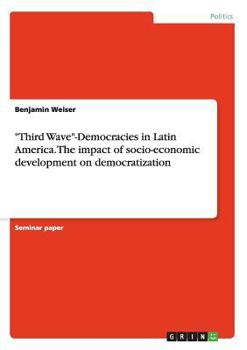"Third Wave"-Democracies in Latin America. The impact of socio-economic development on democratization
Seminar paper from the year 2013 in the subject Politics - Region: Middle and South America, grade: 2,0, University of Hagen (Institut f r Politikwissenschaft), course: Modul P2 - Demokratisches Regieren im Vergleich, language: English, abstract: The debate of Seymour Martin Lipset's modernization theory with its involved main claim of a strong correlation between democratization and socio-economic modernization is discussed on a deepened level by the pioneers of transformation studies. Tatu Vanhanen appositely clarified that - at the best case - developing countries are passing through a political modernization process by achieving the final stage of democracy at the same extent as their socio-economic development (Vanhanen 2003). Based on this thought the transformation scientists do widely agree: by all means, there has to be an evident interdependence between the level of socio-economic development and the ability for democracy. But is this causality a necessary or even a sufficient condition? If we want to go further into this question, Latin America might be a fruitful area. Especially in the presently proclaimed "century of globalization and power shift" there is a considerable research interest on developing global areas such as Latin America1. According to the assignment's title my research question is: how meaningful is the impact of socio-economic parameters for the democratization of postauthoritarian countries of the "Third Wave" in Latin America?
Format:Paperback
Language:English
ISBN:3656658889
ISBN13:9783656658887
Release Date:June 2014
Publisher:Grin Verlag
Length:28 Pages
Weight:0.11 lbs.
Dimensions:0.1" x 5.8" x 8.3"
Customer Reviews
0 rating





